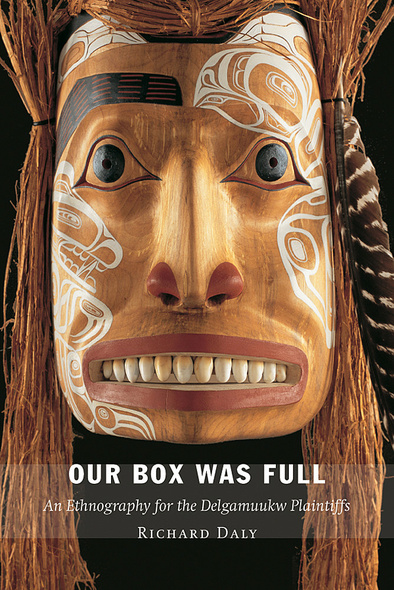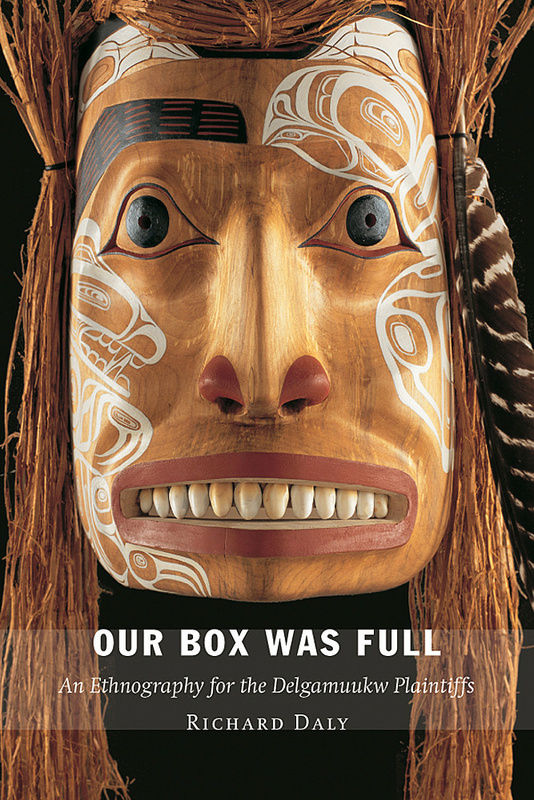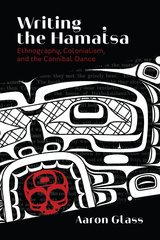
For the Gitksan and Witsuwit’en peoples of northwest British Columbia, the land is invested with meaning that goes beyond simple notions of property or sustenance. Considered both a food box and a storage box of history and wealth, the land plays a central role in their culture, survival, history, and identity. In Our Box Was Full, Richard Daly explores the centrality of this notion in the determination of Aboriginal rights with particular reference to the landmark Delgamuukw case that occupied the British Columbia courts from 1987 to 1997.
Called as an expert witness for the Aboriginal plaintiffs, Daly, an anthropologist, was charged with helping the Gitksan and Witsutwit’en to “prove they existed,” and to make the case for Aboriginal self-governance. In order to do this, Daly spent several years documenting their institutions, system of production and exchange, dispute settlement, and proprietorship before Pax Britannica and colonization. His conclusions, which were originally rejected by Justice MacEachern, were that the plaintiffs continue to live out their rich and complex heritage today albeit under very different conditions from those of either the pre-contact or fur trade eras.
Our Box Was Full provides fascinating insight into the Delgamuukw case and sheds much-needed light on the role of anthropology in Aboriginal rights litigation. A rich, compassionate, and original ethnographic study, the book situates the plaintiff peoples within the field of forager studies, and emphasizes the kinship and gift exchange features that pervade these societies even today. It will find an eager audience among scholars and students of anthropology, Native studies, law, and history.
Awards
- 2006, Shortlisted - Harold Adams Innis Prize, Canadian Federation for the Humanities and Social Science
Daly’s text combines documentation, analysis, critique, reflection and poetry without succumbing to false objectivity, unnecessarily abstract theorizing, self indulgence, or romanticism. Readers are left with respectful and complicated understandings of Gitksan and Witsuwit’en peoples as historical and contemporary agents that defy simplistic and demonized or idealized portraits.
Ultimately, Daly provides a deeply compelling description of the courage and enduring strength of Gitksan and Witsuwit’en peoples. Our Box Was Full is an important resource for the Gitksan and Witsuwit’en and other aboriginal peoples, and non-aboriginal peoples as well.
A means of communicating much-needed information that is quite controverial and that we may not wish to hear is to draw a brief of evidence that is both factually precise and yet entertaining and, at times, fascinating if not riveting. This is the task that Dr. Richard Daly has undertaken and achieved with extraordinary success ... Dr. Daly excels at the fundamental skill of the writer: to excite the reader’s interest in the subject matter to the extent that one is gripped by the account ... Indeed, this book succeeds to a remarkable extent in reducing complex and challenging questions of anthropology into understandable concepts and explanations.
Richard Daly, an independent anthropologist living in Norway, gave the most extensive ethnological expert opinion regarding Aboriginal rights and title ever heard before a Canadian court in the landmark case known as Delgamuukw…In [Our Box was Full] Daly is marvelously candid and thoughtful, and his is perhaps the clearest statement in print of the issues facing anthropologists engaged in legal testimony.
Richard Daly has had the singular experience of providing the most extensive ethnological opinion evidence heard before any Canadian court with respect to Aboriginal rights and title. His analysis and conclusions are finally being made available to the wider academic and legal communities and are a tribute to the Gitksan and Witsuwit’en elders who entrusted Dr. Daly with their histories.
Maps and Figures
Foreword / Michael Jackson
Foreword / Peter Grant
Preface
1 Introduction
2 The Reciprocities of a Pole-Raising Feast
3 A Giving Environment: Nutrition and Seasonal Round
4 A Kinship Economy
5 Production Management and Social Hierarchy
6 Gifts, Exchange, and Trade
7 Owners and Stewards
8 Epilogue
Afterword: Back to the Future / Don Ryan, Masgaak
Notes; References; Index







